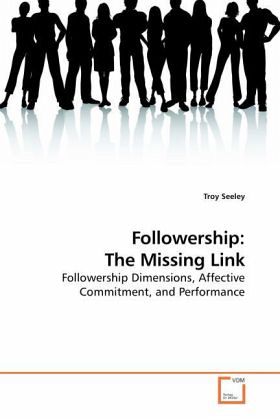
Followership: The Missing Link
Followership Dimensions, Affective Commitment, and Performance
Versandkostenfrei!
Versandfertig in 6-10 Tagen
39,99 €
inkl. MwSt.

PAYBACK Punkte
20 °P sammeln!
For decades, researchers and philosophers alike have been writing about the importance of leadership. However, literature has largely ignored contributions made by followers. In today's changing work environment, an increasing number of followers are being empowered and asked to take on more responsibility. The current study investigated the relationship between Kelley's (1992) followership dimensions (i.e., active engagement and independent thinking) and affective commitment and performance (in-role and extra role). In addition, Kelley's (1992) scale of followership was statistically refined....
For decades, researchers and philosophers alike have been writing about the importance of leadership. However, literature has largely ignored contributions made by followers. In today's changing work environment, an increasing number of followers are being empowered and asked to take on more responsibility. The current study investigated the relationship between Kelley's (1992) followership dimensions (i.e., active engagement and independent thinking) and affective commitment and performance (in-role and extra role). In addition, Kelley's (1992) scale of followership was statistically refined. The results revealed significant positive correlations between a single dimension of followership and the outcome variables. Consequently, no relationships were found between independent thinking and the outcome variables. Post hoc analyses revealed a mean difference between gender and affective commitment as well as in-role performance and age. Finally, confirmatory factor analyses of the followership scale revealed that a 12-item 2-factor solution was factorially and statistically sound.












